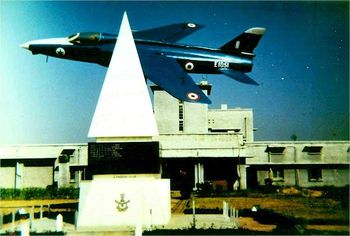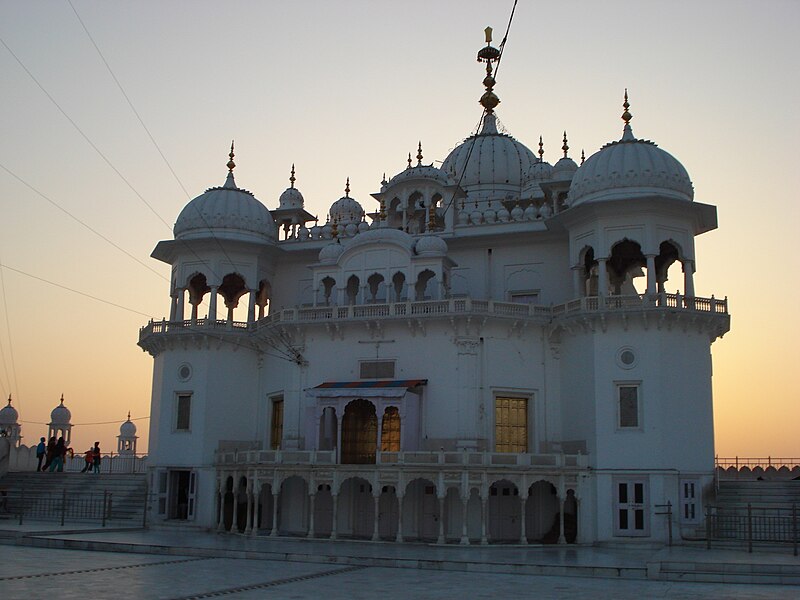Ambala is essentially a twin city consisting of Ambala cantonment and Ambala city. It has a large Indian army and Indian Air Force presence.Ambala is known as a city of scientific instruments.It is famous for its food, wholesale and cloth market.
How to reach here:
By Air: The closest Airport is the Chandigarh airport which is well connected to other major cities of India.
By Rail: Ambala cantonment junction is one of the famous and biggest junctions in North India.It is well connected to the major parts of India.
Best time to visit: October to March
Languages spoken: Hindi , Punjabi and English.
Must eat: Kadhi Chawal, Chole Bhature, Gol guppas, Khasta Kachori.
Famous Restaurants: Chaupal, Hot millions, Puran Singh ka Dhaba
Places you must visit:
Lakhnaur Sahib Gurudwara is a major pilgrim center associated with Sikh guru, Guru Govind Singh. It is considered sacred as the guru learned to handle weapons along with the art of Khido-Khundi,gatka baaji- teer - andazi, neja bhaje and Dhal talwar at this place.
Gurudwara Manji Sahib was constructed at the place visited place by the sixth Guru, of Guru Hargobind Singh on his way to meet Mughal emperor, Jahangir. Gurudwara Manji Sahib also features a pond and a baoli (well), which is believed to have been constructed during the stay of Guru Hargobind Singh.As per the legend of the shrine, the villagers of Majri complained of the water scarcity. Addressing their issue of perennial water shortage, Guru advised natives to dig a baoli. Owing to this, the famous pilgrim centre is also known as Baoli Sahib.The site was turned to Gurudwara in 1764, when Dal Khalsa distributed territory of Ambala to Sardar Mehar Singh of Nishananwali Misl. Gurudwara was further rebuilt by Maharaja Hira Singh of Nabha during 1871-1911.

Air Force Base in Ambala, an inherited British airbase, is one of the oldest and largest airbases of Indian Air Force. The airbase played a vital role in 1947-48 Kashmir Operations, when Spitfires and Harvards were operated from the base.The Flying Instruction School (FIS) was established at the base in 1948, but was re situated to Tambaram in Chennai in 1954 due to Pakistan warfare. War memorial was dedicated to aircrew who that lost their lives in war and flying missions from the airfield, known as 'Jatt Di Pasand' is a major highlight of the base.

Anandpur Sahib is one of the five most important pilgrimages for Sikhs. Abode of joy, tThe pilgrim centre is situated along with Naina Devi hills in it’s backdrop. The worship place It is believed to be the place of baptism of Sikh community known as Khalsa - the pure ones.Guru Tegh Bahadur raised a new habitation in 1665 at Makhowal. The shrine celebrates Hola Mohalla with great pomp and show for saluting the martial spirit of Sikh community.

Rani Ka Talab is one of the historic testimonies, of the town built by Raja Ranjit Singh of Chhachhrauli. The 400 year old pond is positioned within Ambala Cantonment. and is currently under the authority of Indian Army. Along with the pond, there is an ancient Shiv Mandir and Devi Mandir, managed by the Indian Army.

Planetarium at Ambala is among country's first planetariums, established in the 1950s. The planetarium was designed by Pandit Jagannath Sharma who was, a spearhead in the scientific instruments manufacturing industry. The planetarium features gear system of steel, gun metal and aluminium alloy for keeping a check on the movement of the globe.Apart from this, Pandit Jagannath Sharma also built a telescope for seeing moon craters, polar cap of Mars and the moons of Jupiter.

Jain Mandir is one of the most revered worship centers in the region and, which is believed to house 2,500 years old idols. Situated at Ambala Sadar, the shrine houses four idols of Jain deities in the temple. According to the folklore, the Jain Temple was established 150 years ago.Chanda Prabhu is the biggest sculpture housed in the temple. Among other sculptures are Parshavnath, Arihant and Shantinath. The sculpture of Shantinath is carved on a marble. Some other idols were also excavated from a site at Pinjore.

Holy Redeemer Church was built under the British rule, when troops of East India Company were transferred from Karnal to Ambala. Constructed in 1848, the catholic church also features two rooms initially made for the troops, which are used as a dispensary and a reading room at present. The church was visited by Lord Ripon, the only Catholic Viceroy of India, during his visit to Shimla.The church collapsed and a new church was constructed at the same place in 1905. There is a memorial stone, marking the site of the high altar of the old Church to the north of the present church. The new church has a huge tower, sturdy pillars and elevated Gothic roof.

Ambika Devi Mandir is not only the oldest shrines but also an origin of the place. Dedicated to Goddess Amba, Ambika and Ambalika, the ancient Hindu shrine was constructed before the British Raj. One of the highlights of the temple is the paintings on the upper walls and ceilings., which have faded over the years.

Kharga Golf Club is among the oldest golf courses of the country, established in 1891 at Ambala Cantonment. The golf club was laid by the Britishers and was used by the British Officers for golf.The management of the club was handed over to the Army in 1972. Thereafter, the club was expanded and was renamed as Golden Golf Club. In 1980's, the headquarters of Kharga Corps were transferred to Ambala Cantonment and renamed to Kharga Golf Club.

No comments:
Post a Comment